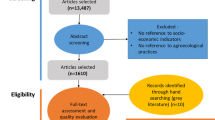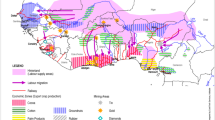Abstract
While global capital uses various mechanisms to control and govern the agri-food system, counter-movements have been rising with self-protecting measures against the intrusion of the market system and development. Ashok Kumbamu critically examines this ‘double movement’ in the agri-food sector at a time of convergence of three global crises of food, energy, and climate. He looks at the organizational strategies and alternative development initiatives of the Deccan Development Society in southern India.


Similar content being viewed by others
Notes
For a comparative analysis of nutritional value of millets, rice, and wheat, see www.ddsindia.com/www/gendering_agriculture.html, accessed 1 September 2011.
www.ddsindia.com/www/pdf/BHS%20of%20ZHB%20A%20Profile.pdf; www.ddsindia.com/www/pdf/12%20MBF%20report.pdf, accessed 1 September 2011.
The DDS receives funding from various international development agencies in Germany, Norway, Sweden, Canada, the UK, the Netherlands, and Switzerland, and also from various state and central government agencies. See www.ddsindia.com/www/default.asp, accessed 22 January 2010.
References
Altieri, Miguel A. (2009) ‘Agroecology, Small Farms, and Food Sovereignty’, Monthly Review 61 (3): 102–113.
Center for Human Rights and Global Justice (2011) Every Thirty Minutes: Farmer suicides, human rights, and the agrarian crisis in India, New York: NYU School of Law.
Escobar, Arturo (2001) ‘Culture Sits in Places: Reflections on globalism and subaltern strategies of localization’, Political Geography 20 (2): 139–174.
Ilaiah, Kancha (2009) Post-Hindu India. A discourse on dalit-bahujan, socio-spiritual and scientific revolution, New Delhi: Sage Publications.
Kumbamu, Ashok (2009) ‘The Global Knowledge Encounter: A sociological analysis of the introduction of genetically modified seed in Warangal, India’, International Social Science Journal 60 (195): 25–36.
McMichael, Philip (2000) ‘The Power of Food’, Agriculture and Human Values 17 (1): 21–33.
McMichael, Philip (2007) Development and Social Change: A global perspective, Los Angeles: Pine Forge Press.
Mookerjea, Sourayan (2009) ‘Dalitbahujan Women's Autonomous Video’, in Kevin Howley (ed.) Understanding Community Media, London: Sage Publications.
Phillips, Lynne (2006) ‘Food and Globalization’, Annual Review of Anthropology 35 (October): 37–57.
Polanyi, Karl (1957) The Great Transformation, Boston: Beacon Press.
Routledge, Paul (1993) Terrains of Resistance, Nonviolent Social Movements and the Contestation of Place in India, London: Praeger.
Salomeyesudas, Buduru and V. Satheesh Periyapatna (2009) ‘Traditional Food System of Dalit in Zaheerabad Region, Medak District, Andhra Pradesh, India’, in Harriet V. Kuhnlein, Bill Erasmus and Dina Spigelski (eds.) Indigenous Peoples’ Food Systems: The many dimensions of culture, diversity and environment for nutrition and health, Rome: FAO.
Acknowledgements
I thank Michael Gismondi at Athabasca University for discussion and suggestions. I thank P. V. Satheesh and other members of the Deccan Development Society for sharing with me their experiences in building the organization. I also thank the participants of the ‘Green Economy and Sustainable Development’ conference organized by UNRISD, Geneva, in October 2011 for their comments and discussion.
Additional information
Presents the experience of the Deccan Development Society as an alternative to market systems in agriculture
Rights and permissions
About this article
Cite this article
Kumbamu, A. The Agri-food Sector's Response to the Triple Crisis: Sustaining local social initiatives in Andhra Pradesh, India. Development 55, 104–111 (2012). https://doi.org/10.1057/dev.2011.101
Published:
Issue Date:
DOI: https://doi.org/10.1057/dev.2011.101




